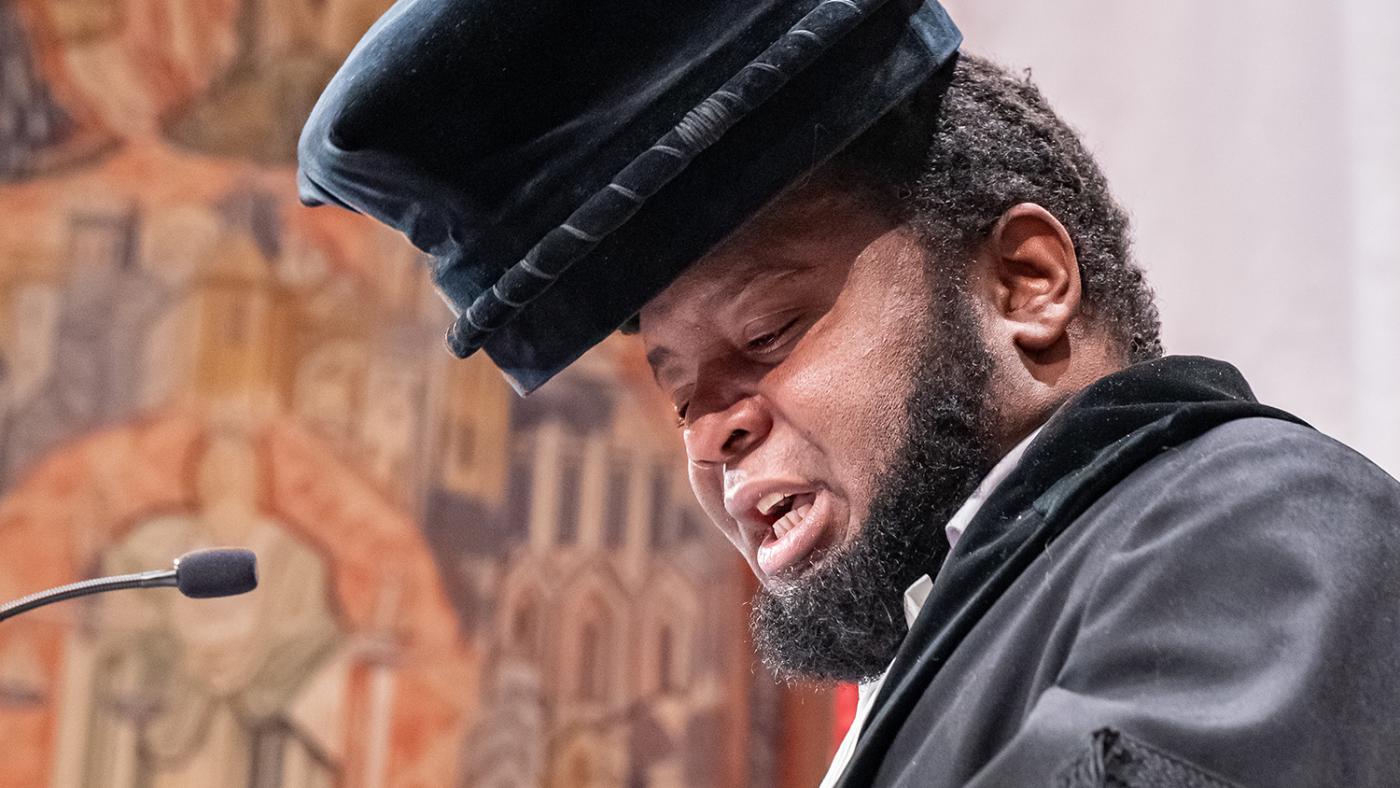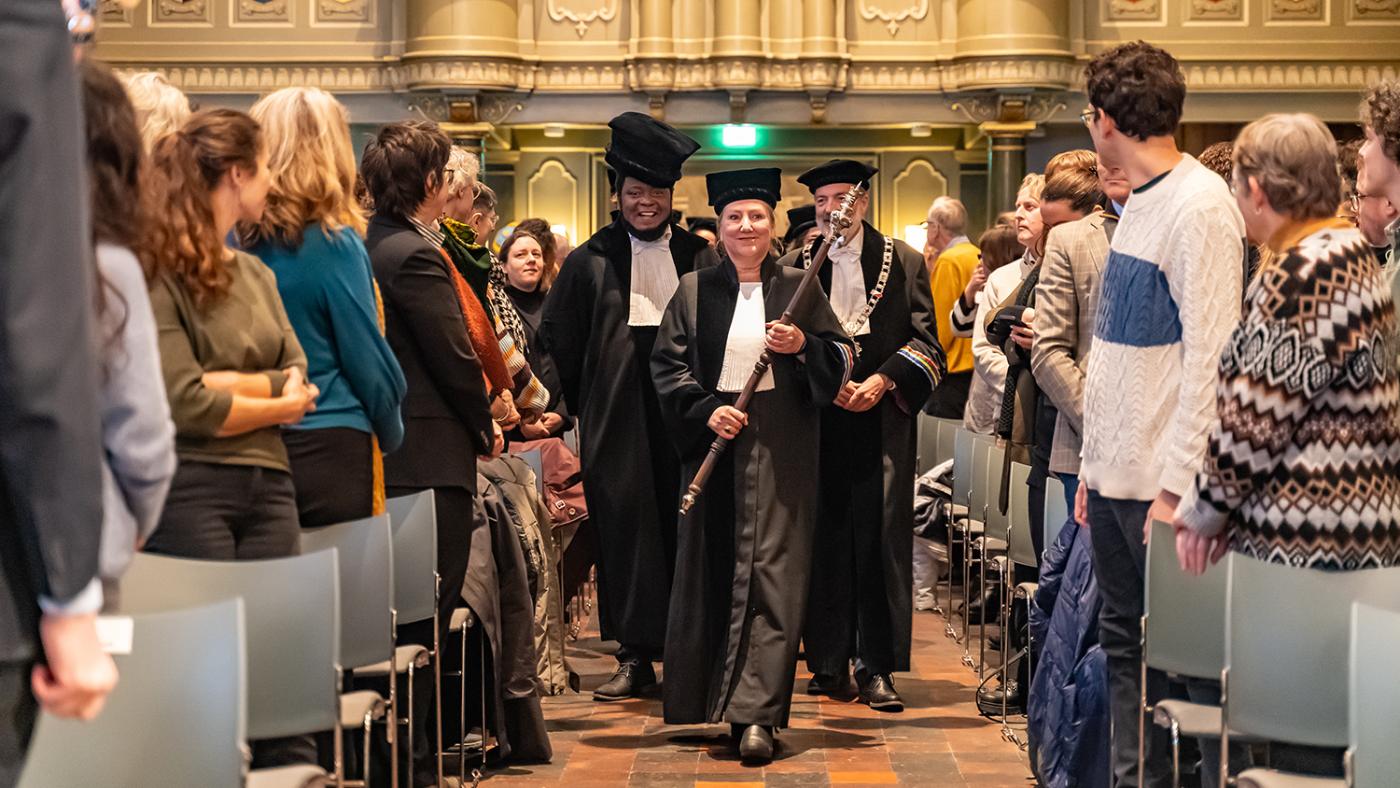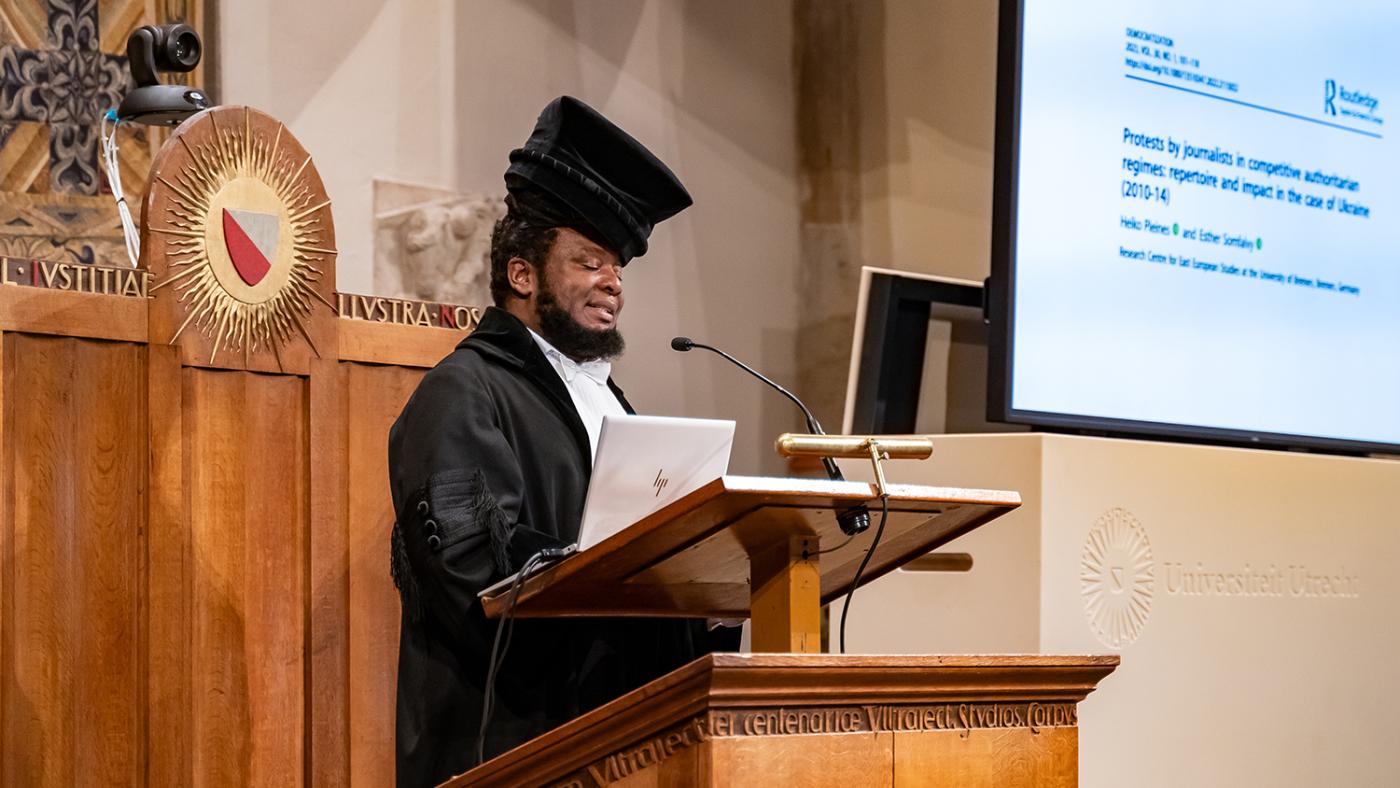Bruce Mutsvairo: from Harare ghetto to professor in Utrecht
‘The Netherlands should be proud of its polder model’

This past January, Bruce Mutsvairo stood in the Utrecht University building giving his inaugural address as a professor of Media, Politics & Global South. As a little boy, he dreamed of being a journalist. Although he is no longer a journalist, he is now a professor publishing about journalism. “My passion for journalism is still there,” he says. “As a scientist, I have more time and space to think about the role of journalism.”
Mutsvairo's journey towards professorship is extraordinary. His ambition, eagerness to learn and hard work has always propelled him forward.
Mutsvairo grew up in Mbare, a residential neighbourhood for labour migrants in Harare, then the capital of Rhodesia (currently Zimbabwe). Mbare was a place said to be dangerous for tourists, but the ghetto did have character — among other reasons, because reggae singer Bob Marley performed there once. It was also a breeding ground for creative initiatives. Growing up, Mutsvairo had to buy the newspaper for his father, who was a police chief, every day. “I loved that and I dreamt of one day writing for that newspaper myself.” Bruce mentions this dream everywhere he goes.
To make this dream come true, he needed support. In Harare, he ran into a Dutch tourist who was travelling through Africa. The tourist asked him what he wanted to be when he grew up and he spontaneously replied: “A journalist.” The Dutchman was impressed by the boy's ambitions and eagerness to learn, so he decided to help him. He stayed in touch with the tourist and his partner, who lived in Brabant. The couple supported him in following a one-year journalism course in New Zealand and an additional course in Russia. Mutsvairo then continued his education at University College Utrecht. "My education in Utrecht shaped me into who I am," he says now. "Here I encountered stimulating teachers and students with the common desire to work hard, which suited me."
After his time at UCU, he had the opportunity to do a Master’s in Journalism in Cardiff, financed by the Dutch Institute for Southern Africa. Once he obtained his diploma, he contacted the press agency Associated Press in Amsterdam, whose editor-in-chief had given a guest lecture at UCU. Brustvairo asked him for his card on the occasion. “I contacted them after Cardiff and, to my surprise, they invited me over. I started out reporting on weekend sports events, but once I had more experience, I was allowed to write about conflict areas in Africa — about Angola, for instance.”
His dream had come true but he wanted to go even further. So, he went to Leiden for a PhD on the influence of new media in the political debate. He worked abroad for nine years after obtaining his PhD. First, he was a lecturer at universities in England and Australia and, from 2019 on, he served as a professor at Auburn University in the United States. When his wife obtained her PhD as well and then got a job at UU, Mutsvairo was happy to return to his beloved city. This led to his current position as a Professor of Media, Politics & Global South.
During his inaugural address, Rector Henk Kummeling explained that, by appointing Mutsvairo, UU is signalling its desire to pay more attention to the Global South. “This is a theme that has been a little bit neglected at UU these past few years but we want to revive it through collaborations with South Africa and Suriname. Mutsvairo’s appointment should also be seen in that light.”

Bruce Mutsvairo's inaugural address. Photo: Laura Hompus
What does Global South mean, exactly?
“For many people, Global South is the new name for non-Western parts of the world. Others view it as a different word for developing countries. Some people speak of the Global Majority, in the sense that the southern countries have the highest number of people. I don’t see it like that. It’s a very politically-coloured way of looking at it. In any case, it’s hard to make a clear distinction. Global South is everywhere, including the Netherlands. It’s the starting point for contact with others, wherever they’re from. If you’re in touch with your neighbours who have a different cultural background than you do, you’re in contact with the Global South. That means my area of research is much broader. The position is called politics, media and Global South for good reason – it’s all connected. I prefer to talk about Global Engagement.”
Are there differences between how the media works here and in the Global South?
“In my inaugural address, I mentioned that the World Press Freedom Index ranks countries like the United Kingdom, Australia and Slovenia lower than countries like Namibia and Costa Rica. The Netherlands dropped for a bit after the murder of Peter R. de Vries but is now back in sixth place.
But, in general, you can make a distinction between democratic and authoritarian regimes. In Russia and China, there is no free press. The same is true for many African countries. The interesting thing is that it’s exactly in such authoritarian communities that journalists use international digital platforms to spread information that the regime wants to keep hidden. A Sudanese journalist told me that these platforms are the most important news sources in her country.”
Apart from your position as a professor in Utrecht, you’re also a Unesco professor focusing on disinformation. What kind of developments do you see in that area?
“I can easily combine the Unesco position with my work in Utrecht, as the areas generally coincide. I see disinformation as a huge problem. I have a somewhat old-fashioned view of the media's role. For me, the media has to be neutral. It’s supposed to be about facts as that helps ensure media outlets are reliable as well. What I see now — and that’s going on all around the world — is that journalism is used to promote a certain vision. Look at the United States, where a channel like Fox uses the medium to decide for people what they should think. This is going on everywhere, worldwide. When people are allowed to spew wrong information in talk shows without being contradicted, that’s a bad thing. The same has been going on on social media for a long time. Everyone can share their opinion, uncontrolled. It often doesn't have anything to do with the topic, they’re looking for personal attacks. Preferably without having a conversation. That’s scary.”

Bruce Mutsvairo. Photo: Laura Hompus
How can we combat this?
“I think it’s important that for higher education to pay more attention to this. I try to make my students aware of the fact that they shouldn’t accept everything at face value. You always have to be aware that not all information is reliable. I have met young people in Overvecht who spread conspiracy theories because they truly believe in them.
We’re also searching for ways to better regulate the media on platforms like TikTok or X, in order to prevent people from deliberately spreading wrong or manipulated information. But the most important thing for me is that we should talk to each other and have those dialogues. Everyone’s free to think what they want, you don’t have to agree with each other, but you should talk to each other. The Netherlands is known for its ‘polder’ model of compromise. That makes the Netherlands special in comparison to other countries. Let's cherish that and create space for everyone.”
Can we have a dialogue with someone who bases their opinion on wrong information or racist suppositions? What does that yield?
“It’s my opinion that freedom of speech should not be curtailed. People should have the freedom to express themselves, as long as they don’t break the law. At the same time, everyone should take responsibility for what they say. I’m afraid that if we are too strict on what people are allowed to say, we will step into this authoritarian trap. When you engage in a dialogue, you search for solutions or try to find out why someone holds a certain position. What I saw in the United States is people distancing themselves from each other, quickly resorting to personal attacks; they aren’t open to other people’s opinions. You could see that regarding Black Lives Matter, for instance. In the Netherlands, it's happening with migration. I wouldn’t mind talking to Geert Wilders and seeing what we do and do not agree on, based on factual information.”
What role can the university play in this process?
“The university has a very important role in this regard. We have to establish connections with the communities around us. Universities should help solve the challenges societies are faced with by starting those dialogues and encouraging debate. Listening is a very important part of that. When election results are not what we expect, we shouldn't say other voters are crazy or poorly educated. We have to try our best to make our work accessible to these groups and talk to each other.
If you’re from a family where no one has ever gone to university, it’s easy to think that universities are only for the elite, for rich people. However, the university should be a place where people of all backgrounds are welcome. That’s why it’s good that UU organises things like Meet the Professor, where professors visit primary schools. Diversity starts at primary school, which is why we should show children what we do at university.”
As a black professor in a predominantly white university, you are a role model. What are your experiences in that regard?
“I love working at Utrecht University. When I compare it to other universities I’ve worked at, the workload is a bit higher. This past year I was asked to join many committees, like the one about UU’s slavery past and the work group on Equality, Diversity and Inclusion. Sometimes, I have to watch out and ensure I have enough time left for my regular tasks. But what I do sincerely appreciate is that people at UU try their best to make everyone feel at home, which isn’t always easy.
Sometimes, I see intergenerational complexities. Young people are more focused on social justice and don’t have much eye for the university’s history, while older people base their way of thinking on their own experiences and aren’t as open to young people’s reforms. We need to try and navigate that, and I believe there are solutions to these issues. The university offers leadership tracks, for instance. I joined one myself, and you really get new insights that can be used in practice.”